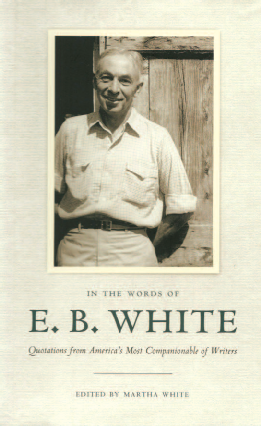![]() CU Press publishes a collection of E. B. White's quotations
CU Press publishes a collection of E. B. White's quotations
CU Press publishes a collection of E. B. White's quotations
In Charlotte's Web, a spider saves a pig's life by weaving a few well-chosen words. Like his beloved character, author and essayist E. B. White '21 touched millions with his deft, straightforward prose. Now readers can peruse some of his sayings—both famous and obscure—in In the Words of E. B. White, published by Cornell University Press and edited by the writer's granddaughter, Martha White.

Many modern readers know White for his classic children's novels—Charlotte's Web, Stuart Little, and The Trumpet of the Swan. But his literary legacy owes as much to his prolific career as a New Yorker essay-ist during his years in the city and, later, in rural Maine, where his family still resides. That state provided inspiration for much of his work, and many of the quotations in In the Words of E. B. White are taken from poems, essays, and novels written during these later years. "I would really rather feel bad in Maine," he wrote in a 1937 letter, "than feel good anywhere else."
The book includes White's thoughts on such subjects as old age, New York City, language, and rural life. His words are often funny: "I was lucky to be born abnormal," he wrote. "It ran in the family." Each quote is characterized by the same no-frills phrasing that he and Cornell professor William Strunk Jr., PhD 1896, drummed into generations of English students with their grammar guide, The Elements of Style. "He had the ability to speak great truths with a minimalist style," says CU Press's Jonathan Hall, who likens reading the new collection to "talking to an old friend." The book is the first in a series featuring quotes from notable figures; future subjects include Theodore Roosevelt and Frederick Douglass.
In the Words of E. B. White was completed in about a year, thanks to Martha White's familiarity with her grandfather's work as the executrix of his literary estate. She initially hesitated to publish his quotations, she says, but agreed in the hope of familiarizing readers with some of her grandfather's lesser-known work. "It's ironic that this book will probably be used in great part by public speakers," she adds, "because my grandfather never liked to give speeches." She notes that, especially later in life, White objected to having his work excerpted, for fear it would be taken out of context. "All I hope to say in books . . . is that I love the world," he wrote to a Charlotte's Web fan. "I guess you can find that in there, if you dig around."
White once remarked that as a child he was taught to be seen and not heard—but as an adult, he would rather be "heard and not seen." But as he wrote in the foreword to an essay: "Whoever sets pen to paper writes of himself, whether knowingly or not, and this is a book of revelations."
— Amanda First '12
{youtube}xU6nbdhuUR8{/youtube}
Caption: Book Trailer by CU Press (1:39)


